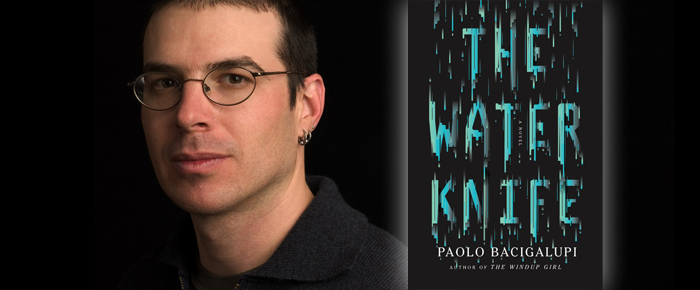
By Heidi Simmons
—–
“The Water Knife”
by Paolo Bacigalupi
Fiction
—–
With water restrictions in place, California is beginning to understand the value of water and how life might change for permanently if this drought does not end soon. In Paolo Bacigalupi’s novel, The Water Knife (Knopf, 384 pages) a world without water is a dark, dirty and dangerous place.
Set in the near future – maybe two, ten or 100 years – the Southwest is at war over water. California, Nevada and Arizona fight to get their share of what’s left of the Colorado River. This shortage has forced other states to block people from immigrating to northern states and the Federal government is powerless to intervene.
Food production and energy generation has been dramatically affected by drought conditions leaving inhabitants hungry and without electricity. Dust storms block out the sun and make everything gritty.
People are desperate to leave Phoenix and mass at the boarders, but armed militias shoot and kill those trying to cross illegally. Texans are loathed and considered the dregs of society. Showers are rare and a cup of water is expensive.
States have water Czars who control and enforce the use of water. Corruption has created local water lords, cartels and gangs who rule the slums of the migrating masses while the wealthy luxuriate in controlled environments called “arcologies.”
Angel Velasquez is a “water knife. ” It’s his job to cut off water supplies. He is a well-paid muscle for Catherine Case, head of Southern Nevada’s Water Authority. Case is ruthless and will stop at nothing to ensure the Las Vegas arcology developments stay lush for her rich clientele.
Angel and a team of trained enforcers are sent to destroy a water treatment plant that serves a community of 100,000 people. The spilling of blood is more common than the spilling of water.
When rumors of water rights to an ancient Indian aquifer surface, a desperate search ensues as each state scrambles to get access to the water worth billions of dollars.
Lucy Monroe, a Pulitzer Prize winning journalist, has been covering the water problems in Phoenix. She could go north, but doesn’t want to. Her friend is dead and she knows it has everything to do with the lost water rights.
Maria Villarosa just wants to go north to start a new life. But she too is caught up in the hunt for the water rights. It could mean a future for her in the north. Circumstances bring the three together, but each has an agenda of his and her own.
The world in The Water Knife is a frightening scenario to be sure. It is easy to see how quickly civilization could collapse when water becomes scarce. Author Bacigalupi does a good job painting the horror of a boarder town filled with corruption, violence and suffering of those who simply want to find a better life.
There is plenty of action and thrills as the protagonist Angel finds himself caught up in dangerous situations that could cost him his life. But then, everyone in this story is on the edge of death. One wrong move, and not only Angel, but Lucy and Maria could end up at the bottom of an empty pool where the dead are tossed away like trash. Life without water and surviving the mayhem is a daily challenge.
This story is very timely. The California drought is serious. We all know that water is essential for life and we can’t live without it. So the subject is compelling. However, the story bored me. I kept waiting for the suspense to build and the characters to converge for a life-changing action-filled climax to change the course of their reality – it never happens.
I wanted to learn more about water rights and what it means when California has “senior” rights and the Native Americans have “junior” rights. The novel missed some valuable lessens on water distribution and how the states share the Colorado River.
Much of the information was redundant and the characters’ dialogue was more about charming banter than the seriousness of their dire situation and the need to get the water rights into the right hands.
The plot was disjointed and amiss. The story felt like a first draft. Or simply, it was the author’s lack of maturity as a storyteller. He couldn’t deliver the promise of the premise. Perhaps this book was rushed to publication to capitalize on the current water crisis, but it failed to keep me at the edge of my seat. I thirsted for more desperate action and a sweet twist of fate for the threesome.
The Water Knife did however make me consider a future without water. It made me grateful that our desert community – our oasis — has an aquifer with its own water source. For that, I am more than grateful.









































